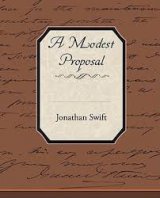A Modest Proposal Page #2
A Modest Proposal For preventing the Children of Poor People From being a Burthen to Their Parents or Country, and For making them Beneficial to the Publick, commonly referred to as A Modest Proposal, is a Juvenalian satirical essay written and published anonymously by Jonathan Swift in 1729.
Those who are more thrifty (as I must confess the times require) may flea the carcass; the skin of which, artificially dressed, will make admirable gloves for ladies, and summer boots for fine gentlemen. As to our City of Dublin, shambles may be appointed for this purpose, in the most convenient parts of it, and butchers we may be assured will not be wanting; although I rather recommend buying the children alive, and dressing them hot from the knife, as we do roasting pigs. A very worthy person, a true lover of his country, and whose virtues I highly esteem, was lately pleased, in discoursing on this matter, to offer a refinement upon my scheme. He said, that many gentlemen of this kingdom, having of late destroyed their deer, he conceived that the want of venison might be well supply'd by the bodies of young lads and maidens, not exceeding fourteen years of age, nor under twelve; so great a number of both sexes in every country being now ready to starve for want of work and service: And these to be disposed of by their parents if alive, or otherwise by their nearest relations. But with due deference to so excellent a friend, and so deserving a patriot, I cannot be altogether in his sentiments; for as to the males, my American acquaintance assured me from frequent experience, that their flesh was generally tough and lean, like that of our school-boys, by continual exercise, and their taste disagreeable, and to fatten them would not answer the charge. Then as to the females, it would, I think, with humble submission, be a loss to the publick, because they soon would become breeders themselves: And besides, it is not improbable that some scrupulous people might be apt to censure such a practice, (although indeed very unjustly) as a little bordering upon cruelty, which, I confess, hath always been with me the strongest objection against any project, how well soever intended. But in order to justify my friend, he confessed, that this expedient was put into his head by the famous Salmanaazor, a native of the island Formosa, who came from thence to London, above twenty years ago, and in conversation told my friend, that in his country, when any young person happened to be put to death, the executioner sold the carcass to persons of quality, as a prime dainty; and that, in his time, the body of a plump girl of fifteen, who was crucified for an attempt to poison the Emperor, was sold to his imperial majesty's prime minister of state, and other great mandarins of the court in joints from the gibbet, at four hundred crowns. Neither indeed can I deny, that if the same use were made of several plump young girls in this town, who without one single groat to their fortunes, cannot stir abroad without a chair, and appear at a play-house and assemblies in foreign fineries which they never will pay for; the kingdom would not be the worse. Some persons of a desponding spirit are in great concern about that vast number of poor people, who are aged, diseased, or maimed; and I have been desired to employ my thoughts what course may be taken, to ease the nation of so grievous an incumbrance. But I am not in the least pain upon that matter, because it is very well known, that they are every day dying, and rotting, by cold and famine, and filth, and vermin, as fast as can be reasonably expected. And as to the young labourers, they are now in almost as hopeful a condition. They cannot get work, and consequently pine away from want of nourishment, to a degree, that if at any time they are accidentally hired to common labour, they have not strength to perform it, and thus the country and themselves are happily delivered from the evils to come. I have too long digressed, and therefore shall return to my subject. I think the advantages by the proposal which I have made are obvious and many, as well as of the highest importance. For first, as I have already observed, it would greatly lessen the number of Papists, with whom we are yearly over-run, being the principal breeders of the nation, as well as our most dangerous enemies, and who stay at home on purpose with a design to deliver the kingdom to the Pretender, hoping to take their advantage by the absence of so many good Protestants, who have chosen rather to leave their country, than stay at home and pay tithes against their conscience to an episcopal curate. Secondly, The poorer tenants will have something valuable of their own, which by law may be made liable to a distress, and help to pay their landlord's rent, their corn and cattle being already seized, and money a thing unknown. Thirdly, Whereas the maintainance of an hundred thousand children, from two years old, and upwards, cannot be computed at less than ten shillings a piece per annum, the nation's stock will be thereby encreased fifty thousand pounds per annum, besides the profit of a new dish, introduced to the tables of all gentlemen of fortune in the kingdom, who have any refinement in taste. And the money will circulate among our selves, the goods being entirely of our own growth and manufacture. Fourthly, The constant breeders, besides the gain of eight shillings sterling per annum by the sale of their children, will be rid of the charge of maintaining them after the first year. Fifthly, This food would likewise bring great custom to taverns, where the vintners will certainly be so prudent as to procure the best receipts for dressing it to perfection; and consequently have their houses frequented by all the fine gentlemen, who justly value themselves upon their knowledge in good eating; and a skilful cook, who understands how to oblige his guests, will contrive to make it as expensive as they please. Sixthly, This would be a great inducement to marriage, which all wise nations have either encouraged by rewards, or enforced by laws and penalties. It would encrease the care and tenderness of mothers towards their children, when they were sure of a settlement for life to the poor babes, provided in some sort by the publick, to their annual profit instead of expence. We should soon see an honest emulation among the married women, which of them could bring the fattest child to the market. Men would become as fond of their wives, during the time of their pregnancy, as they are now of their mares in foal, their cows in calf, or sow when they are ready to farrow; nor offer to beat or kick them (as is too frequent a practice) for fear of a miscarriage. Many other advantages might be enumerated. For instance, the addition of some thousand carcasses in our exportation of barrel'd beef: the propagation of swine's flesh, and improvement in the art of making good bacon, so much wanted among us by the great destruction of pigs, too frequent at our tables; which are no way comparable in taste or magnificence to a well grown, fat yearly child, which roasted whole will make a considerable figure at a Lord Mayor's feast, or any other publick entertainment. But this, and many others, I omit, being studious of brevity.
Translation
Translate and read this book in other languages:
Select another language:
- - Select -
- 简体中文 (Chinese - Simplified)
- 繁體中文 (Chinese - Traditional)
- Español (Spanish)
- Esperanto (Esperanto)
- 日本語 (Japanese)
- Português (Portuguese)
- Deutsch (German)
- العربية (Arabic)
- Français (French)
- Русский (Russian)
- ಕನ್ನಡ (Kannada)
- 한국어 (Korean)
- עברית (Hebrew)
- Gaeilge (Irish)
- Українська (Ukrainian)
- اردو (Urdu)
- Magyar (Hungarian)
- मानक हिन्दी (Hindi)
- Indonesia (Indonesian)
- Italiano (Italian)
- தமிழ் (Tamil)
- Türkçe (Turkish)
- తెలుగు (Telugu)
- ภาษาไทย (Thai)
- Tiếng Việt (Vietnamese)
- Čeština (Czech)
- Polski (Polish)
- Bahasa Indonesia (Indonesian)
- Românește (Romanian)
- Nederlands (Dutch)
- Ελληνικά (Greek)
- Latinum (Latin)
- Svenska (Swedish)
- Dansk (Danish)
- Suomi (Finnish)
- فارسی (Persian)
- ייִדיש (Yiddish)
- հայերեն (Armenian)
- Norsk (Norwegian)
- English (English)
Citation
Use the citation below to add this book to your bibliography:
Style:MLAChicagoAPA
"A Modest Proposal Books." Literature.com. STANDS4 LLC, 2025. Web. 9 Mar. 2025. <https://www.literature.com/book/a_modest_proposal_22>.








Discuss this A Modest Proposal book with the community:
Report Comment
We're doing our best to make sure our content is useful, accurate and safe.
If by any chance you spot an inappropriate comment while navigating through our website please use this form to let us know, and we'll take care of it shortly.
Attachment
You need to be logged in to favorite.
Log In